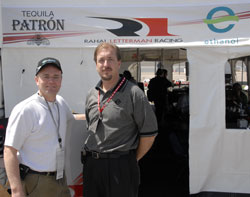During a White House press briefing on Monday with European leaders, President Bush commented on his goals for renewable fuels and the current research in producing ethanol from sources other than corn in response to a foreign journalist’s question about global environmental concerns:
I have said we’ll have a mandatory fuel standard, not a voluntary fuel standard, but a mandatory fuel standard that will reduce our uses of gasoline by 20 percent over a 10-year period of time. We believe that ethanol and biodiesel, the spread of ethanol and biodiesel are — the goal of spreading ethanol and biodiesel is achievable, that’s what we believe. And we’re spending a lot of money to achieve that goal.
Now, the spread of ethanol in the United States is not going to be achievable if we rely only upon corn. There is a limit to the amount of ethanol we can produce with corn as a feedstock. So our research dollars are going to what they call cellulosic ethanol, and that means the ability to make ethanol from switchgrasses or wood chips. And we’re spending a lot of money to that end.
 And it is a mandatory approach. And the reason why I laid it out is because, one, I do believe we can be better stewards of the environment; and, two, I know it’s in our national interest to become less dependent on foreign sources of oil. The fundamental question is, will America be able to develop the technology necessary for us to achieve the goal. I think we can. It’s in our interest to share that technology, not only with our partners who are wealthy enough to spend money on research dollars, but also with the developing world.
And it is a mandatory approach. And the reason why I laid it out is because, one, I do believe we can be better stewards of the environment; and, two, I know it’s in our national interest to become less dependent on foreign sources of oil. The fundamental question is, will America be able to develop the technology necessary for us to achieve the goal. I think we can. It’s in our interest to share that technology, not only with our partners who are wealthy enough to spend money on research dollars, but also with the developing world.
Now you talk about helping alleviate poverty in the developing world — wouldn’t it be wonderful if the developing world could grow crops that would enable them to power their automobiles, so they wouldn’t have to be dependent on foreign oil, either. And that’s the message I took down to South America, with Lula, and to Central America. For example, sugar cane is the most — you’re learning about ethanol here, but sugar cane is the most efficient way to make ethanol. It turns out in Central America there is a lot of land and opportunity to continue to produce cane, which means that the Central American countries could be eventually net exporters of energy. So we’ve got a lot of common ground and a lot of area to work on.
 Gulf Ethanol plans to build a facility for ethanol production and blending near the Port of Houston.
Gulf Ethanol plans to build a facility for ethanol production and blending near the Port of Houston.

 The U.S. Department of Energy (DOE) will provide up to $200 million, over five years to support the development of small-scale cellulosic biorefineries in the United States.
The U.S. Department of Energy (DOE) will provide up to $200 million, over five years to support the development of small-scale cellulosic biorefineries in the United States.  According to
According to  The 48th Annual Corn Dry Milling Conference is coming up May 31 – June 1 at the National Center for Agricultural Utilization Research in Peoria, Illinois. The conference is jointly sponsored by the North American Millers’ Association and the National Center for Agricultural Utilization Research Agricultural Research Service, USDA.
The 48th Annual Corn Dry Milling Conference is coming up May 31 – June 1 at the National Center for Agricultural Utilization Research in Peoria, Illinois. The conference is jointly sponsored by the North American Millers’ Association and the National Center for Agricultural Utilization Research Agricultural Research Service, USDA.
 There are 115 biodiesel plants in the United States with a combined production capacity of 865 million gallons a year — about five days of total U.S. distillate consumption, according to industry group, the National Biodiesel Board (NBB).
There are 115 biodiesel plants in the United States with a combined production capacity of 865 million gallons a year — about five days of total U.S. distillate consumption, according to industry group, the National Biodiesel Board (NBB).  One of the people I met at the Kansas Speedway this weekend was Troy Hobbs, Monsanto Corn Biofuels Strategy Lead (left). He’s pictured here with
One of the people I met at the Kansas Speedway this weekend was Troy Hobbs, Monsanto Corn Biofuels Strategy Lead (left). He’s pictured here with 
 Seattle-based Imperium Renewables is making an investment in its own future by loaning money to Propel Biofuels to build its first biodiesel filling stations in Washington state.
Seattle-based Imperium Renewables is making an investment in its own future by loaning money to Propel Biofuels to build its first biodiesel filling stations in Washington state. Rob Elam, president of Propel Biofuels, said that the company is looking to have its biodiesel equipment installed at about 20 fueling stations in Washington, Oregon and California by the end of this year.
Rob Elam, president of Propel Biofuels, said that the company is looking to have its biodiesel equipment installed at about 20 fueling stations in Washington, Oregon and California by the end of this year. And it is a mandatory approach. And the reason why I laid it out is because, one, I do believe we can be better stewards of the environment; and, two, I know it’s in our national interest to become less dependent on foreign sources of oil. The fundamental question is, will America be able to develop the technology necessary for us to achieve the goal. I think we can. It’s in our interest to share that technology, not only with our partners who are wealthy enough to spend money on research dollars, but also with the developing world.
And it is a mandatory approach. And the reason why I laid it out is because, one, I do believe we can be better stewards of the environment; and, two, I know it’s in our national interest to become less dependent on foreign sources of oil. The fundamental question is, will America be able to develop the technology necessary for us to achieve the goal. I think we can. It’s in our interest to share that technology, not only with our partners who are wealthy enough to spend money on research dollars, but also with the developing world.